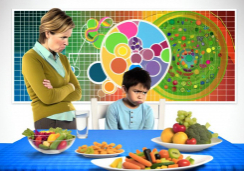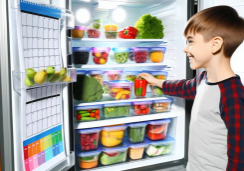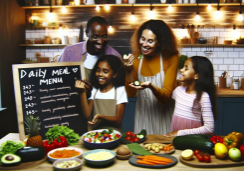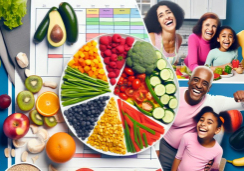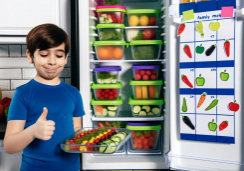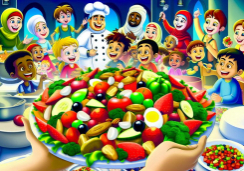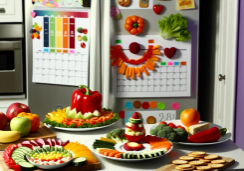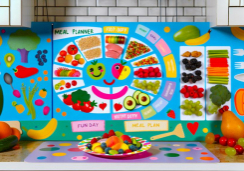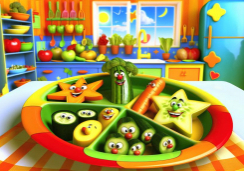Ultimate Guide to High-Protein Vegan Meal Planning
Imagine you're embarking on a journey through a dense, uncharted forest—much like the often bewildering world of vegan nutrition—where each step forward requires careful planning and a reliable compass to ensure you're hitting your protein targets without animal products.
You've likely heard the myths that a plant-based diet can't provide enough protein, especially if you're aiming to build muscle or enhance athletic performance. Yet, here you stand, ready to debunk those myths and fortify your meal plan with an arsenal of high-protein vegan options.
As you prepare to navigate this terrain, you'll find that the path isn't as daunting as it seems, with a map in hand that outlines everything from the essential foods to the strategies that can make your meal prep both satisfying and efficient.
Stick around, and you'll uncover the secrets to optimizing your diet, ensuring that you're well-equipped for the journey ahead, and perhaps you might even find the experience to be surprisingly enjoyable.
Essential High-Protein Vegan Foods
Incorporating a variety of essential high-protein vegan foods into your diet ensures adequate protein intake without relying on animal products. Beans, like black beans, are a staple, providing about 15 grams of protein per cup. They're not only packed with protein but also with fiber and essential amino acids, making them a cornerstone of any high-protein vegan meal plan.
Lentils are another powerhouse, offering 18 grams of protein per cup. Their versatility allows you to add them to soups, salads, or make them the base of a dish.
Tofu, with an impressive 20 grams of protein per cup, can be transformed into almost any texture or flavor, fitting seamlessly into your plant-based diet.
Don't overlook edamame, which brings 17 grams of protein per cup to the table—perfect for snacking or as a side.
And while spinach might seem modest with 5 grams of protein per cup when cooked, it's a valuable addition to your high protein vegan arsenal, especially when you consider its iron content.
Tailoring Your Meal Plan
Having established the essential high-protein vegan foods that should form the foundation of your diet, it's crucial to personalize your meal plan to cater to your unique nutritional requirements and goals.
To optimize your body composition, you must align your vegan meal plan with your daily calorie needs and fitness goals. High in protein options are vital for maintaining lean muscle, but the serving size may vary depending on whether you're aiming to build muscle, lose fat, or maintain your current weight.
Your calorie needs are determined by several factors, including your age, gender, weight, height, and level of physical activity. Use a calorie calculator to estimate your needs and adjust your meal plans accordingly. Remember, a one-size-fits-all approach doesn't work, as everyone's body reacts differently to various diets.
Consider using a prep guide to streamline your cooking process and ensure you're getting a variety of nutrients. Don't forget to adjust for any food allergies or intolerances you may have. Experimenting with different high-protein vegan ingredients can keep your diet interesting and satisfying.
Lastly, seek professional guidance if needed. A dietitian can help tailor your meal plan to ensure it supports your health and enhances your performance in line with your fitness objectives.
Daily Meal Plan Breakdown
To maximize nutritional benefits and efficiency in your high-protein vegan diet, let's break down a typical day's meal plan that includes three main meals and two snacks, strategically designed to support your health and fitness goals.
Kick-off your day with a vegan breakfast of Carrot Cake overnight oats, prepped the night before. One serving starts you off with a healthy meal packed with both flavor and nutrients.
Then, for a mid-morning snack, indulge in Chia Pudding, a food list staple that's as delicious as it's protein-rich.
Lunch calls for a Tofu Scramble, incorporating a variety of vegetables for a balanced intake. Vegan Meal Prep is key here—sweet potatoes and brown rice are pre-prepared to streamline the process. Each portion should contribute a substantial number of grams of protein per serving, keeping you fueled throughout the afternoon.
Come the evening, a sheet pan meal simplifies dinner. A mix of tofu and an array of vegetables, married with a savory sauce and baked, creates a simple yet satisfying dish. This method of Vegan Meal Prep ensures you get a healthy meal without excess time spent in the kitchen.
Vegan Meal Prep Strategies
As you organize your weekly meals, remember that effective vegan meal prep strategies not only simplify your diet but also ensure you're hitting those high-protein targets essential for your health and fitness. Start by crafting a diverse shopping list that includes high-protein vegan staples like beans, lentils, tofu, edamame, and spinach. Make sure each serving contributes to your overall protein intake, crucial for muscle development and weight loss, if that's your goal.
To streamline your meal prep, consider batch-cooking Vegan Freezer Breakfast Burritos or whipping up a large bowl of Blueberry Almond Chia Pudding for a grab-and-go breakfast. For lunch, a Vegan Kale Caesar Salad with Tofu Croutons can be prepped ahead, ensuring you get a protein boost midday.
Your 7-day meal plan should feature protein-rich dinners like Tofu & Vegetable Curry, Vegan Mushroom Stroganoff, and Vegan Beet Burgers. Customize your plan to match your energy needs, adjusting calorie content as necessary while maintaining a focus on high-protein dishes.
Incorporating these strategies helps you maintain complete nutrition throughout the day, saves time, and supports overall well-being. Whether you're an athlete looking for performance support or simply aiming for a balanced vegan diet, prep is key.
Protein-Rich Recipes and Ideas
Explore a plethora of protein-rich vegan recipes that can easily integrate into your meal plan, ensuring you get the essential nutrients with every bite. Start your day with a high-protein avocado toast: mash a ripe avocado with fresh chopped cilantro, a squeeze of lime, and a sprinkle of taco seasoning. Spread it over whole grain bread and top with sliced tomatoes for an extra nutrient kick.
For lunch, go for a super simple sweet potato and black bean salad. Roast sweet potatoes until tender, mix with black beans, fresh chopped red onions, and a dressing of lime juice and minced garlic. It's a really good balance of complex carbs and protein, keeping you satisfied and energized.
Snack on celery sticks with peanut butter or create a chia pudding by mixing chia seeds with almond milk and a touch of maple syrup. Let it sit overnight and top with fresh berries for a protein-packed treat.
Dinner can be a hearty tofu curry or a beet burger, both providing around 20 grams of protein per serving. Pair these with a side of steamed edamame or a kale Caesar salad to round out your nutrient profile.
These protein-rich recipes and ideas make high-protein vegan meal planning both delicious and nutritious.
Frequently Asked Questions
What Do Vegans Eat on a High Protein Day?
On a high-protein day, you'll eat protein-rich quinoa, tofu scramble, seitan stir-fry, lentil soups, and edamame snacks. You'll enjoy chickpea salads, hemp seed toppings, vegan protein shakes, and black bean tacos.
How Can Vegans Get 140g of Protein a Day?
To get 140g of protein, you'd include protein-rich legumes, explore tofu versatility, and utilize seitan's potential. Add nutritional yeast, protein-packed quinoa, edamame snacks, and chia seed benefits. Don't forget hemp hearts, almond butter, and spirulina boost.
What Is the Highest Form of Protein for Vegans?
Tofu is your top vegan protein source, packed with versatility and nutrients. Explore legume varieties, tempeh benefits, and protein-rich seeds like hemp hearts. Don't overlook edamame snacks or nutrient-dense spirulina for a protein boost.
How to Get 150g Protein Vegan?
To reach 150g of protein as a vegan, include protein-rich legumes, seitan stir-fries, and nutritional yeast. Snack on hemp seeds, blend vegan protein smoothies, and enjoy tofu scrambles and edamame appetizers daily.
Conclusion
You've got all the tools you need for high-protein vegan success. Remember, it's about balancing macros while fueling your body with nutrient-dense foods.
Start prepping those protein-rich meals, tweak them to fit your unique energy needs, and relish the benefits. Whether you're an athlete or simply health-conscious, your plant-powered journey is now set for takeoff.
Dive into those recipes, and watch how your body thrives. Ready, set, prep!

